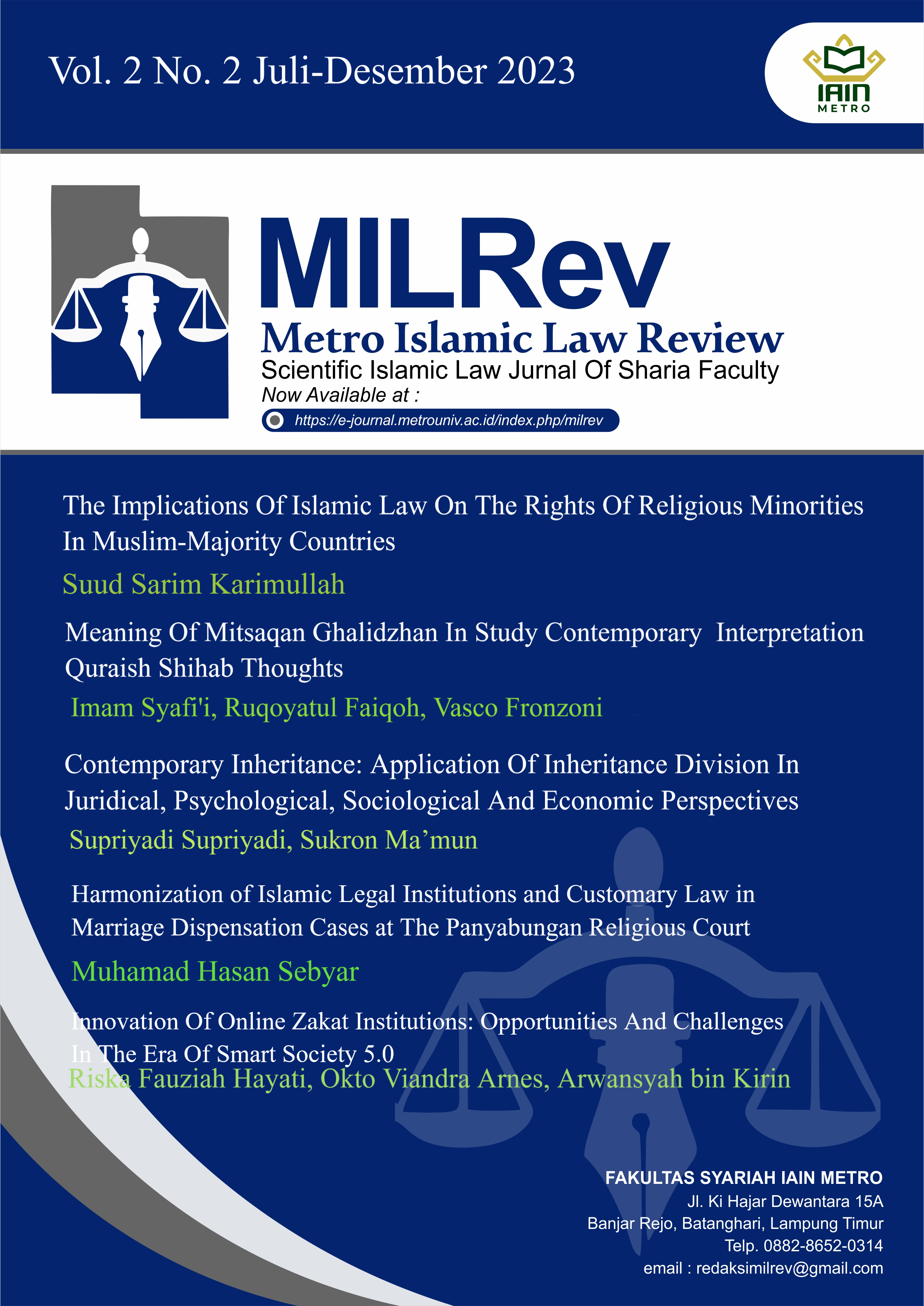An Exploration of the Innovation Developed and Adopted by Indonesian Online Zakat Institutions in the Era of Smart Society 5.0
Abstract
This article aims to examine the paradigm shift towards Smart Society 5.0, a concept which has been observed to significantly influence diverse aspects of human existence, including the economic realm, with specific emphasis on the management of zakat. Furthermore, the investigation thoroughly explores aspects such as the advancements made by online zakat institutions in Indonesia, as well as opportunities and challenges presented within the framework of Smart Society 5.0. In order to achieve the stated aim, three online zakat institutions were examined in this article namely Dompet Dhuafa, Lazismu, and Rumah Zakat using a qualitative method with content analysis. The obtained results showed that online zakat institutions present great opportunities in the era of Smart Society 5.0, hence, leading to the categorization of Indonesia as a country that supports the achievement of sustainable development. Based on observations, the aforementioned institutions have experienced continuous growth, as well as developed and adopted various innovations through the use of technology while also paying substantial attention to the welfare and needs of the community. Over the years, Indonesia has shown immense potential for zakat, as evidenced by the rising community interest. This trend is further facilitated by the introduction of effective and efficient online zakat platforms, which use advancements in technology and science for seamless integration and operation. Moreover, it is important to acknowledge that online zakat institutions in the 5.0 era must address several challenges. These include enhancing knowledge and literacy regarding online Zakat among potential contributors, fostering muzakki consciousness, and ensuring trust through increased institutional accountability and transparency in fund collection. Additionally, it is crucial that these institutions implement robust management supervision systems, promote the awareness and adoption of e-zakat through effective socialization efforts, uphold the concept of continual innovation, strengthen resources, and reinforce adopted regulatory frameworks.
Downloads
References
Andreia G. Pereira, dkk., “Industry 4.0 and Siciety 5.0: Opportunities and Threats”, International Journal of Recent Tecnology and Engineering (IJRTE), Vol. 8 No. 5 (2020), 3305-3308.
Atushi Deguchi, dkk., Society 5.0, A People-Centric Super-Smart Sociaty, Hitachi-UTokyo Laboratory, The University of Tokyo, 2018, 1-25, https://doi.org/10.1007/978-981-15-2989-4.
Badan Amil Zakat Nasional (BAZNAS), https://baznas.go.id.
Badan Pusat Statistik (BPS), https://www.bps.go.id.
Carin Holroyd, “Technological Innovation and Building a ‘Super Smart’ Society: Japan’s Vision of Society 5.0”, Journal of Asian Public Policy, Vol. 15, No. 1 (2022), 18-31, DOI: https://doi.org/10.1080/17516234.2020.1749340
Dompet Dhuafa Pusat-Zakat Online Terpercaya, https://donasi.dompetdhuafa.org.
Indria Puspitasari Lenap, “Sosialisasi Pelatihan Pemanfatan Aplikasi E-Zakat untuk Pembayaran Zakat secara Online pada Staf Pengajar da Pegawai di TK/PAUD Rinjani Universitas Mataram”, Prosiding PEPADU, Vol. 1, 2019, 106.
Isnaetul Mutiya Rohmah, dkk., “Analisis Efektivitas Pembayaran Zakat Melalui Layanan Online pada Lembaga Amil Zakat Rumah Zakat”, Jurnal Masharif al-Syariah: Jurnal Ekonomi dan Perbankan Syariah, Vol. 6 No. 2 (2021), 478-490.
Keidanren (Japan Business Federation), Toward realization of the new economy and society. Reform of the economy and society by the deepening of “Society 5.0”, 2016, http://www.keidanren.or.jp/en/policy/2016/029_outline.pdf.
Khairul Rijal dan Nilawati, “Potensi Pembayaran Zakat Secara Online dan Offline Serta Realiasi Dana Zakat di Indonesia”, I-Economics : A Researc Journal on Islamic Economics, Vol. 5 No. 2 (Desember 2019), 116-131.
Lazismu, https://lazismu.org.
Arief Mufraini, Akuntansi dan Manajemen Zakat, Mengomunikasikan Kesadaran dan Membangun Jaringan, Cet. 1 (Jakarta: Kencana Prenada Media Group, 2006), 161.
Marhanum Che Mohd Salleh dan Mohammad Abdul Matin Chowdhury, “Technological Transformation in Malaysian Zakat Institutions: A Qualitative Analysis”, International Journal of Zakat, Vol. 5 No. 3 (2020), 44-56.
Meghna M Nair, Amit Kumar Tyagi “The Future with Industry 4.0 at the Core of Society 5.0: Open Issues, Future Opportunities and Challenges”, 2021 International Conference on Computer Communication and Informatics (ICCCI), DOI: https://doi.org/10.1109/ICCCI50826.2021.9402498.
O. Skobelev, S. Y. Borovik, “On the way from Industry 4.0 to Industry 5.0: From digital manufacturing to digital society”, International Scientific Journal "Industry 4.0" (2017), 307-311.
Rumah Zakat-Donasi Online Rumah Zakat, https://www.rumahzakat.org.
S.Yousefikhah, Sociology of Innovation: Social Construction of Technology Perspective, AD-Minister, 2017, 31–43. doi:10.17230/ad-minister.30.2.
Uswatun Hasanah, “Analisis Potensi Penerimaan Zakat Melalui E-Commerce pada Masa Pandemi Covid-19”, Journal of Islamic Social Finance Management, Vol. 1 No. 1 (Januari-Juni 2021), 122-134.
Winda, “Implementasi Teknologi Informasi dan Komunikasi dalam Zakat untuk Meningkatkan Kesejahtraan Masyarakat Miskin”, JEBI : Jurnal Ekonomi dan Bisnis Islam, Vol. 3 No. 2 (Juli Desember 2018), 227-236.
Yuko Harayama, (2017). Society 5.0: Aiming for a New Human-centered Society. Collaborative Creation through Global R&D Open Innovation for Creating the Future, Vol. 66 No. 6 (August 2017). Hitachi Review, 8-13. Hitachi Review Vol. 66, No. 6. http://www.hitachi.com/rev/archive/2017/r2017_06/pdf/p08-13_TRENDS.pdf.
Yuskar, “Kajian Efektivitas Pengelolaan Zakat sebgai Suatu Usaha untuk Pemberdayaan Masyarakat dan Pengentasan Kemiskinan di Kota Padang”, Jurnal Kajian Akuntansi dan Auditng, Vol. 8 No. 1, April 2013.










